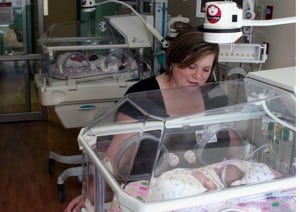NICU Cameras Narrow Distance to UAMS for Jonesboro Couple
Aug. 30, 2010| On July 11, Paula Parnell was taken by ambulance from Jonesboro to UAMS where she delivered twin daughters three months before their due date. It was a harrowing experience; Kinsley and Tinsley weighed just 2 pounds 6 ounces and 2 pounds 2 ounces, respectively. Three weeks later, the three of them were relaxing in a spacious private room in UAMS’ neonatal intensive care unit (NICU). Both babies were gaining weight and doing well; they slept in special isolettes that were recently built with web cameras attached. For Paula and her husband, Skip – both new to parenting – the camera is important. While Paula generally spends one day a week back in Jonesboro, Skip recently had to return to his full-time job there as a federal security officer. “We think the cameras are wonderful,” said Paula, a certified athletic trainer. “It’s very helpful to us, and especially to Skip. He thinks it’s great. When he wakes up at 2 o’clock in the morning he can turn the computer on and see what they’re doing.” The NICU has 10 new Angel Eye cameras for its 58 private NICU patient rooms, giving parents who live in distant locations the ability to see their babies by signing in to a secure UAMS website. Funding for the Angel Eye program came from a $31,750 grant from the Gertrude E. Skelly Charitable Foundation. Demand for the cameras is high, and UAMS has applied for additional funding to buy more cameras. Paula said the ease of use and the camera’s ability to provide video even in darkness are bonuses. “It’s just two clicks of the mouse and you’re on there,” she said. “Another thing we like to do is take still shots of them. If we’re at home and they’re doing something cute we can take a picture of them and print it out. We saw them getting baths one night and took pictures of that.” The cameras also include audio, allowing parents to talk to their babies. The recent camera upgrade is another example of the nationally leading role played by UAMS ANGELS (Antenatal and Neonatal Guidelines, Education and Learning System), a program that uses the latest communications technology to provide long-distance care to rural Arkansas women and their newborns. Both the ANGELS and Angel Eye program were created by Curtis Lowery, M.D., chairman of the UAMS Department of Obstetrics and Gynecology and a maternal-fetal medicine specialist. The new camera system, which is integrated with equipment that’s part of each baby’s technically sophisticated isolette, is believed to be the only one of its kind in the United States. ANGELS officials are working with UAMS BioVentures to market the camera system to hospitals worldwide. The first-generation Angel Eye camera, introduced in 2006, was an exciting breakthrough for parents who were unable to stay at the hospital due to work and other obligations. The program was the first in the United States to deliver real-time video of hospitalized infants directly to their remote families. But those cameras were mounted on IV poles and were rolled to the side of a baby’s isolette. Nurses could not immediately know what parents were seeing on their computer screens back home, so it was difficult to get the camera aimed just right. For parents, signing in to the computer/camera system was tedious. There also were limits on the time spent viewing their baby, and if lights were off, the camera couldn’t show the baby. The redesigned camera is mounted in a protective casing on an arm that swings above the isolette. When a nurse positions the camera above the baby, it provides a wide view, ensuring that the baby is seen by family back home or wherever they have computer access. The new cameras, available 24 hours a day, have better picture quality and are capable of showing the baby in total darkness. The new audio feature regulates sound levels no matter how loud it is coming through the isolette speaker from a parent’s microphone. Whether it’s a barking dog or a loud sibling, the audio system limits the sound in the isolette to 65 decibels. ANGELS and NICU leaders believe the camera system will have long-term benefits for the physical and emotional health of both the baby and the parents.
|
